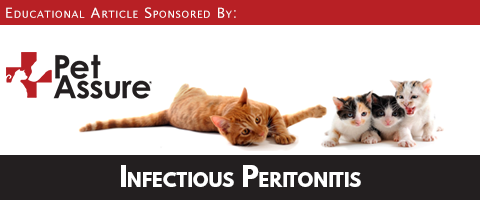Feline infectious peritonitis (FIP) is a fatal disease caused by a virus, which attacks the blood vessels.
There are two forms:
- Wet: fluid collects in the body spaces, spreads throughout the body, and progresses very quickly
- Dry: no fluid in the body spaces, only in specific body systems, and progresses more slowly
Testing for FIP is difficult, and treatment it is usually unsuccessful. FIP is of the least understood cat diseases.
CAUSES:
A virus causes FIP. It spreads from cat to cat through constant contact.
Some factors that can cause FIP to develop include:
- Stress
- Genetic disposition
- Suppressed immune system: from anunderlying illness or anesthesia
SIGNS:
Cats that develop FIP will first show the follow signs:
- Depression
- Fever
- Loss of appetite and weight loss
- Vomiting, diarrhea, and dehydration
Then, they will show signs of Wet FIP or Dry FIP:
Wet Form:
- Swollen belly (fluid in the abdomen)
- Labored breathing(fluid in the chest)
- Dark urine and jaundice: liver failure
- Sudden death (fluid by the heart)
Dry Form:
- Paralysis and loss of balance
- Sensitivity to touch
- Convulsions
- Involuntary urination
- Discoloration of eye, irregular pupil
DIAGNOSIS:
Testing for and diagnosing FIP is difficult because many of thesigns show with other diseases. Some tests your veterinarian may performinclude:
- Routine blood and urine tests
- Organ biopsy
- X-rays, ultrasound: may show fluid in the abdomen or chest
- Chest or abdomen tap: a sample of fluid is drained from the body and tested
TREATMENT:
There is no treatment for FIP. Supportive care (IV fluids, feeding tube, antibiotics etc.) provided by veterinary professionals may help the cat overcome the virus, but survival is highly unlikely. Euthanasia may be the most humane option.
Diagnosing FIP is only to rule out other diseases that are treatable.
PREVENTION:
There is a vaccine available, but the effectiveness of it is not confirmed. Discuss with your veterinarian ifthey recommend it for your cat.
You can take some simple steps to try to prevent FIP.
- Scoop litter frequently
- Keep a stress-free environment
PROGNOSIS:
The prognosis for FIP is very grave, being fatal in most cases.



